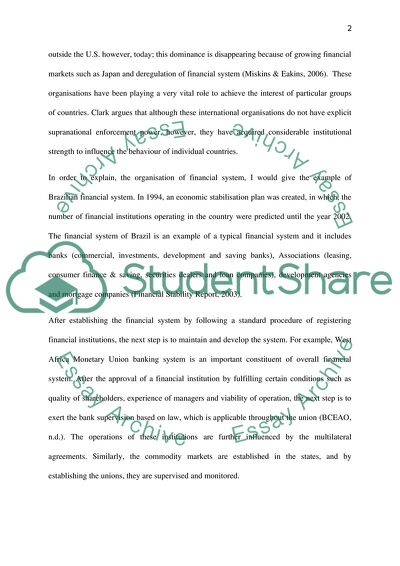
- Home
- Free Samples
- Premium Essays
- Editing Services
- Extra Tools
- Essay Writing Help
- About Us
- Studentshare
- Subjects
- Miscellaneous
- The Organization of financial(debt,equity,foreign exchange,derivative)and commodity markets and their role in international trade and economic performance
The Organization of financial(debt,equity,foreign exchange,derivative)and commodity markets and their role in international trade and economic performance - Essay Example

- Subject: Miscellaneous
- Type: Essay
- Level: Undergraduate
- Pages: 4 (1000 words)
- Downloads: 0
- Author: madelynlueilwit
Extract of sample "The Organization of financial(debt,equity,foreign exchange,derivative)and commodity markets and their role in international trade and economic performance"
Clark (2002) argues that presently, the economic and financial framework is organised with the geographic boundaries therefore, nations have the sovereignty to decide where goods will be produced, how they will be exchanged and who will have the ownership. The control of the government may vary from country to country and but it usually falls between laissez-faire capitalism of 19th century and 20th century communism (Clark, 2002). The nation’s sovereignty does not permit the other nations to interfere however; negotiations can be carried out on country-country basis.
Because of increasing globalisation and multilateral agreements, various international organisations were brought into existence such as International Monetary Fund, World Bank, General Agreement on Tariffs. The increasing internationalisation is reflected by the fact that before 1980s, the financial markets of the U.S. were much higher as compared to the markets outside the U.S. however, today; this dominance is disappearing because of growing financial markets such as Japan and deregulation of financial system (Miskins & Eakins, 2006).
These organisations have been playing a very vital role to achieve the interest of particular groups of countries. Clark argues that although these international organisations do not have explicit supranational enforcement power, however, they have acquired considerable institutional strength to influence the behaviour of individual countries. In order to explain, the organisation of financial system, I would give the example of Brazilian financial system. In 1994, an economic stabilisation plan was created, in which, the number of financial institutions operating in the country were predicted until the year 2002.
The financial system of Brazil is an example of a typical financial system and it includes banks (commercial, investments, development and
...Download file to see next pages Read More
- TERMS & CONDITIONS
- PRIVACY POLICY
- COOKIES POLICY